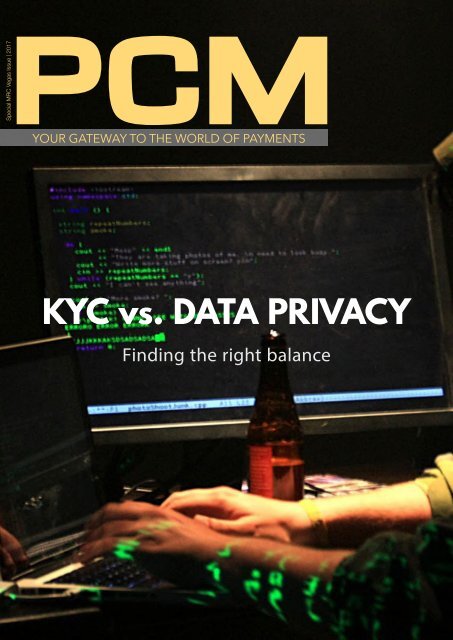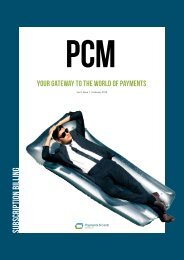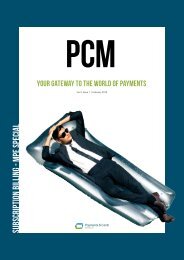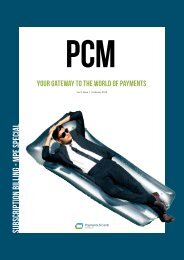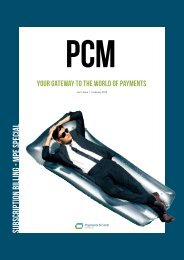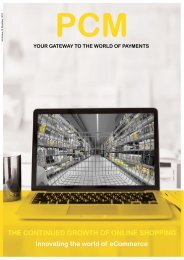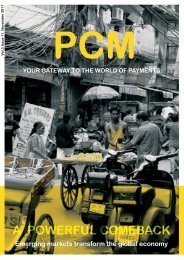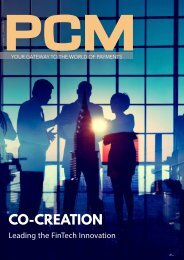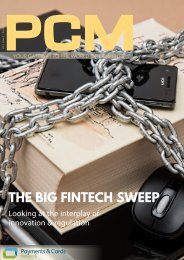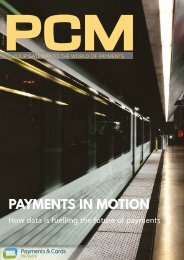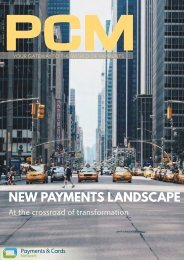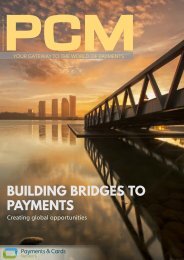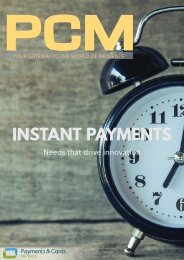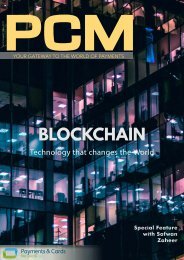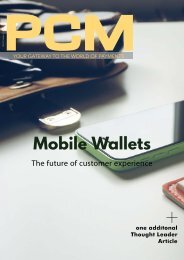PCM - MRC Vegas 2017 Issue
This is a special issue created for the MRC Vegas event in Las Vegas 2017. This special issue focuses on the major challenge of balancing the data gathering processes to provide better products & services to customer but keep their data privacy in mind at the same time
This is a special issue created for the MRC Vegas event in Las Vegas 2017. This special issue focuses on the major challenge of balancing the data gathering processes to provide better products & services to customer but keep their data privacy in mind at the same time
Create successful ePaper yourself
Turn your PDF publications into a flip-book with our unique Google optimized e-Paper software.
Special <strong>MRC</strong> <strong>Vegas</strong> <strong>Issue</strong> | <strong>2017</strong><br />
YOUR GATEWAY TO THE WORLD OF PAYMENTS<br />
KYC vs. DATA PRIVACY<br />
Finding the right balance
MAXIMIZE<br />
YOUR DATA<br />
VALUE<br />
CONNECTING YOU WITH THE PEOPLE TO POWER YOUR BUSINESS EFFICIENCY<br />
CONTACT US NOW<br />
Having data dilemmas? Please contact: simon@digitalsource.io<br />
Digital Source | Herengracht 576 | 1017 CJ | Amsterdam | The Netherlands | +31 (0) 202 373 639
Contents<br />
Amir Abdin<br />
Editor-in-Chief<br />
amir@paymentsandcardsnetwork.com<br />
https://nl.linkedin.com/in/amir-abdin-21365683<br />
STORIES<br />
4<br />
Protecting business and customers: Meeting<br />
the modern anti-fraud challenge<br />
7<br />
Knowing your customer: Easing the tension<br />
between customer identity & privacy<br />
9<br />
The dry acronym that will change the face of<br />
banking<br />
Duc Dang<br />
Production Editor<br />
duc@paymentsandcardsnetwork.com<br />
https://nl.linkedin.com/in/ducdanghh<br />
12<br />
16<br />
The route into the payments world<br />
Start-up Spotlight: 4Stop<br />
THANKS TO OUR PARTNERS<br />
Layla Durani<br />
Editor<br />
layla@paymentsandcardsnetwork.com<br />
https://nl.linkedin.com/in/layladurrani<br />
<strong>PCM</strong> is designed by Duc Dang, Payments & Cards Network. Art<br />
and photos © Payments & Cards Network, picjumbo.com and<br />
Shutterstock.com, excluding advertisments and company logos.<br />
<strong>PCM</strong> is property of Payments & Cards Network, Herengracht 576,<br />
2nd Fl., 1017 CJ, Amsterdam, The Netherlands. All material contained<br />
within <strong>PCM</strong> is the property of Payments & Cards Network. All other<br />
product and service names may be trademarks of their respective<br />
companies. ©<strong>2017</strong> Payments & Cards Network. All rights reserved.<br />
Reproduction of any kind is strictly prohibited without express prior<br />
written consent of Payments & Cards Network.<br />
ADVERTISING INFORMATION<br />
For details, please contact amir@paymentsandcardsnetwork.com<br />
3
Thought Leaders Corner<br />
Protecting business and customers:<br />
Meeting the modern anti-fraud challenge<br />
by Roberto Valerio<br />
Online customers have never been so vulnerable. A<br />
recent survey by Pew Research Center found that 16%<br />
of North Americans have had their email accounts<br />
hacked while 13% claim that someone has taken over<br />
at least one of their social media accounts. In total, 64% of<br />
respondents had personally experienced a major data breach<br />
and 41% had encountered fraudulent charges on their credit<br />
cards 1 .<br />
But why are these numbers so high? One reason is that we each<br />
have far too many online accounts and therefore too many<br />
details to remember. The average Internet user has more than<br />
100 online accounts and the numbers are still rising 2 . People<br />
tend to simplify security measures by using easy-to rememberpasswords.<br />
Unfortunately, easy-to-remember passwords also<br />
tend to be easy-to-break. Fraudsters are aware of this weakness<br />
and are only too happy to exploit it.<br />
Online retailers have tried to encourage tougher security by<br />
rating customer passwords from weak to strong, but even if<br />
the customer is using a strong password, they may be using<br />
the same one across a plethora of accounts. This means that a<br />
fraudster who obtains the password for, say a simple lending<br />
library account, might also be able to access that user’s accounts<br />
across fashion retailers, train operators, insurance providers,<br />
ticket sellers and more.<br />
However, the most critical account is the email account.<br />
Email accounts typically act as the anchor for the user’s whole<br />
online life. Once the fraudster has access there, they can reset<br />
the passwords of other accounts and go on a digital foray,<br />
potentially making fraudulent orders across a lot of online<br />
merchants. Of the 100+ accounts many of us operate online,<br />
the majority are linked to just one email account 3 . Even if a<br />
consumer does try to make their passwords complex and secure,<br />
just one weak password can make them extremely vulnerable. A<br />
single account with a pizza delivery firm that was only used one<br />
time five years ago, but is protected by the password “123456”<br />
can be a huge weak spot. Fraudsters will target these discarded<br />
accounts to gather personal data and wreak havoc.<br />
For those with strong digital security across their digital profiles,<br />
dangers still lurk. Fraudsters can gain access to these accounts<br />
using more sophisticated techniques. Phishing attacks, for<br />
example, have risen sharply over the past few years with an<br />
estimated success rate of 45% in obtaining usernames and<br />
passwords. 4 Malware can also be used to spy on computers<br />
and intercept login credentials.<br />
The problem with account takeovers is that a genuine account<br />
offers fraudsters a significant advantage: trustworthiness.<br />
Online businesses will naturally place much more trust in<br />
existing customer accounts with years of good experience<br />
behind them, than they do with new customer accounts. This<br />
gives fraudsters space in which to hide and enrich themselves.<br />
Looking to the future, we must prepare for how consumers<br />
are likely to secure their online lives in the connected age of<br />
4
Thought Leaders Corner<br />
the Internet of Things. Already we have connected fridges<br />
that order food; cars that make automatic payments at petrol<br />
stations; and thermostats that make heating decisions based<br />
on the location of the user’s phone. Cisco estimates that the<br />
number of machine-to-machine connections will grow by<br />
250% between 2015 and 2020. We can also expect the number<br />
of internet users to grow from 3 billion to 4.1 billion by in this<br />
time. As the internet grows with more people and more devices,<br />
so too do the entry points for fraudsters.<br />
Come & Meet us at<br />
the <strong>MRC</strong> <strong>Vegas</strong><br />
You can find us at<br />
booth #209!<br />
The online threats we all face today have never been greater<br />
or more sophisticated. Many of us access the internet through<br />
a multitude of devices and accounts. But how can fraudsters<br />
be tracked down? The problem is that fraudsters have become<br />
very adept at covering their tracks and masking their identities.<br />
So vendors need to step up their game as well. New fraud<br />
prevention software uses Machine Learning technology to adapt<br />
instantly to the constantly changing patterns within fraud. It<br />
takes the pressure from the merchants to keep their traditional<br />
rule sets up-to-date on a daily basis.<br />
One thing that is certain is that fraudsters will not stop evolving<br />
their techniques. Many run professional-type organisations<br />
whose sole purpose is to steal, sell, manipulate and use customer<br />
data to commit fraud for easy financial wins. The challenge<br />
for the rest of us to stay one step ahead of them. Anti-fraud<br />
engineers will continue to innovate new technologies that work<br />
alongside knowledgeable fraud managers to provide the best<br />
defences for merchants. Merchants will continue to push for the<br />
greatest security available so they can protect their customers.<br />
And customers must ensure they do not make it easy for their<br />
accounts to be compromised.<br />
Risk Ident<br />
Risk Ident is a leading software company that offers efficient<br />
anti-fraud solutions to companies within the ecommerce,<br />
telecommunication and financial sectors - empowering<br />
fraud managers with intelligence and self-learning machine<br />
technology to provide stronger fraud prevention. The<br />
company is home to a veteran team of data scientists and<br />
software engineers with long-term experience in data<br />
analytics and machine learning. Risk Idents products are<br />
specifically tailored to comply with European data privacy<br />
regulations. www.riskident.com/en<br />
Roberto Valerio<br />
CEO - Risk Ident GmbH<br />
Roberto Valerio is founder and CEO of RISK IDENT,<br />
a software development company specialising in<br />
fraud prevention and credit risk evaluation based<br />
on machine learning. He plays an active part<br />
within the fraud prevention community and he is<br />
a member of the European Advisory Board at the<br />
Merchant Risk Council. Beforehand he founded<br />
and worked within different management roles for<br />
software startups. He has a background in business<br />
administration.<br />
1 http://www.pewinternet.org/<strong>2017</strong>/01/26/americans-and-cybersecurity/<br />
2 http://www.itproportal.com/2015/07/23/we-all-have-too-many-online-accounts-and-cant-remember-the-passwords/<br />
org/<strong>2017</strong>/01/26/americans-and-cybersecurity/<br />
3 https://blog.dashlane.com/infographic-online-overload-its-worse-than-you-thought/<br />
4 https://www.itgovernance.co.uk/blog/google-study-phishing-attacks-work-45-of-the-time/<br />
5
Thought Leaders Corner<br />
Knowing Your Customer: Easing the tension<br />
between customer identity and privacy<br />
by Philip Atherton<br />
Meeting Anti-Money Laundering (AML) rules and<br />
following Know Your Customer (KYC) guidelines<br />
isn’t just a headache for payment providers. Getting<br />
it wrong could have serious consequences.<br />
In opposition to this need to know exactly who a customer<br />
is to meet increasingly stringent regulations, customers are<br />
demanding that they keep their details private. One survey<br />
by the Information Commissioner’s Office in 2016 showed<br />
that only a quarter of people trust businesses with their data.<br />
This lack of trust is either a desire for anonymity - perhaps a<br />
reaction to purchasing decisions leading to direct marketing<br />
that they find intrusive – or keeping details private to avoid<br />
being one of the millions of people who have had their details<br />
leaked in a security breach.<br />
There is an unavoidable tension between regulations and the<br />
demands of customers.<br />
Payment transformation<br />
The emergence of mobile, the continued shift towards digital<br />
and instant payments, the rise of cryptocurrencies, and the<br />
wide-ranging impact of various regulations has precipitated<br />
the biggest transformation in payments since the advent of<br />
the internet.<br />
As well AML/KYC regulation, mobile payments are becoming<br />
increasingly popular enabled by a new generation of mobile<br />
phones. Many mobile phones can now read a consumer’s<br />
fingerprint and authenticate a consumer’s identity, giving<br />
merchants and payment providers far greater confidence in<br />
the authenticity of the transaction. Payments can also be tied<br />
directly to a consumer’s account on the merchant side, and<br />
associated to all the information provided to them.<br />
This mobile technology may come in useful given the recently<br />
announced EBA rules on Strong Customer Authentication<br />
(SCA) which will demand that every online and unattended<br />
transaction in Europe over €30 must be subject to SCA –<br />
essentially two-factor authentication – with some exceptions.<br />
Add to this mix the increasing proliferation of digital ID<br />
schemes across the globe, it means that payments, and the<br />
audit trails that help regulate these payments, are changing<br />
quickly.<br />
But consumer demand for privacy is also changing how<br />
payments are made. Bitcoin’s anonymity is major factor in its<br />
popularity. However, with Bitcoin or any other cryptocurrency,<br />
there is a lot of doubt as to how this will fit in highly regulated<br />
markets as anything other than an investment vehicle. In<br />
fact, without systemic changes to the way Bitcoin, or other<br />
similar cryptocurrencies operate, it’s highly unlikely that<br />
they would ever be accepted by the regulators responsible for<br />
European markets. This potential for misuse, as it’s practically<br />
impossible to know where funds are coming from, is too high.<br />
Knowing your customer – when they don’t want you to<br />
know<br />
It’s clear that regulators require, and will continue to<br />
promote, the proliferation of highly-authenticated methods of<br />
payment in the future, with a clear audit trail. However, the<br />
very existence of cryptocurrency indicates a desire among<br />
consumers for a kind of payment system which lets them<br />
remain anonymous.<br />
7
Thought Leaders Corner<br />
About Philip Atherton<br />
Chief Risk Officer @ SafeCharge<br />
Mr. Philip Atherton is the Chief Risk Officer at SafeCharge. Prior to<br />
joining SafeCharge, Philip served in various senior managerial positions<br />
in the card and payments industry at leading payments companies,<br />
Worldpay and Barclaycard. Philip’s extensive experience in cards<br />
payments, risk management and regulation compliance has enabled<br />
him to build and manage teams, deliver significant incremental<br />
value through effective contract negotiation, provide tight control of<br />
compliance frameworks, execute revenue building strategies and have<br />
an in-depth understanding of the regulatory environment.<br />
There are a number of reasons why this anonymity and<br />
privacy is important to many consumers, not just those who<br />
obsess over privacy and do their best to remain ‘off the grid’.<br />
Data breaches, both in the ecommerce sector and outside it,<br />
have shaken consumers’ trust in keeping data safe. Aside from<br />
convenience and choice, one of the biggest drivers of online<br />
payments is that people can pay for goods and services they<br />
may not be comfortable paying for on the high street – a data<br />
breach could leave them exposed. People are simply wary of<br />
giving away their details online, knowing that it exposes them to<br />
fraud and identity theft. Simply meeting AML/KYC regulations<br />
could lead to abandoned transactions and ultimately lost<br />
revenues as people choose to protect themselves rather than<br />
open themselves to more risk.<br />
GDPR will help – but education will help more<br />
The new General Data Protection Regulation (GDPR) rules<br />
due to come into effect in May 2018 may help put consumers’<br />
fears at rest. These rules will address concerns over the data<br />
held by companies, including data held on their payments.<br />
Consumers will be able to request details of what information<br />
is held about them, and also request that it is deleted if it no<br />
longer needs to be held for regulatory reasons.<br />
These regulations can give consumers a better understanding<br />
of how their data is used and held by providing transparency.<br />
However, as an industry this is just part of the solution. For<br />
consumers to trust that their data is safe, there needs to be far<br />
better consumer education on how far the payment industry<br />
goes to ensure that these details remain safe and how they can<br />
help protect themselves.<br />
There is a general reluctance in the payments industry to<br />
fully educate consumers on their rights and the provider’s<br />
obligations, with the burden seen to rest on the consumer. But<br />
if consumers had a much greater understanding of what PCI<br />
compliance meant for their data, they would be much more<br />
willing to trust their data with someone who is accredited.<br />
Even concepts such as tokenisation should not just be jargon<br />
used by the payment industry, but a more widely-understood<br />
term that gives consumers an understanding of how they are<br />
protected, even in the case of a data breach.<br />
Educating consumers in complex payment technology is not<br />
simple – trying to explain PCI compliance and tokenisation to<br />
people who just want to pay for something isn’t easy. But letting<br />
customers know that their payment is protected according to<br />
certain standards, and that certain parties do not have access<br />
to full customer details, could go some way to meeting the<br />
need for privacy and anonymity. A customer more relaxed<br />
about a transaction is one that is more likely to go ahead with<br />
it, easing the tension between identity and privacy.<br />
SafeCharge<br />
SafeCharge is a global provider of technology-based multichannel<br />
payments services and risk management solutions<br />
for demanding businesses, with operations in the UK,<br />
Guernsey, Cyprus, Bulgaria, Israel, Italy, Austria, Singapore<br />
and Hong Kong.<br />
8
The dry acronym that will change<br />
the face of banking<br />
The European Commission’s revised payment services directive brings threats and<br />
opportunities. What will be the attributes needed to survive and prosper in this new,<br />
open world, asks Peter Jan Van De Venn, chief commercial officer at Dutch digital banking<br />
solutions provider, Five Degrees.<br />
by Peter-Jan van de Venn<br />
Thought Leaders Corner<br />
PSD2 sounds technical and bland, like any acronym.<br />
It has hardly registered beyond the banking, fintech<br />
and payments sectors. However, the European<br />
Commission’s revised Directive on Payment Services<br />
could have a seismic impact on customers’ interaction with<br />
their banks.<br />
It opens up Pandora’s Box. Banks are required to provide<br />
access to account data to third parties at the request of<br />
customers. Additionally, the related General Data Protection<br />
Regulation (GDPR) requires banks to ensure the portability of<br />
their customer data.<br />
As we move towards what is now commonly touted as<br />
“open API banking”, PSD2 is expected to be a catalyst for<br />
unprecedented customer-oriented change. It constitutes an<br />
entirely new legal structure for payments across the EU. It<br />
will bring opportunities for banks and fintechs but they will<br />
need to amend their operating, business and revenue models,<br />
as well as the technology that supports these.<br />
In response to PSD2, banks face fundamental choices. Do they<br />
become merely utility providers or the ‘orchestrating hubs’<br />
to facilitate customers, services, providers, and payments?<br />
There will be new alliances and the winners will be those<br />
with greatest control of their capital and of the touch points<br />
on the customer journey, plus corporate and technical agility.<br />
Indeed, technology will be at the forefront and will be the<br />
differentiator between those that can take advantage of the<br />
opportunities and those that will be threatened.<br />
Most interesting will be those banks that decide to set out<br />
their stalls as orchestrating hubs for all kinds of financial<br />
services across a huge marketplace. They will position<br />
themselves as trusted go-betweens for myriad services that<br />
can be added, modified or deleted at will.<br />
This has given rise to the phrase ‘marketplace banking’, the<br />
concept of a bank acting as a go-between and as the hub for<br />
all kinds of financial services, each of which can be easily<br />
coupled or decoupled. To put it bluntly, the new bank is a<br />
bustling bazaar bringing together a world of services to serve<br />
each particular need of any type of customer at any point in<br />
time.<br />
This puts new pressures on the underlying technology<br />
platform, with a prerequisite being seamlessly interconnected<br />
open APIs. This is not just about connecting to the outside<br />
world but also about opening up internally through APIs to<br />
provide access to a bank’s own services. Key elements will<br />
include a digital banking platform that allows a high level of<br />
automation through workflow management and a service and<br />
integration layer to connect to third parties and to allow those<br />
third parties to connect to the bank’s platform and services.<br />
All backed up by reliable, up-to-date, all-encompassing data.<br />
According to Gartner, digital leaders and CIOs in EUbased<br />
banks should also use the introduction of PSD2 to<br />
upgrade their digital banking capabilities to fundamentally<br />
now support the expectations of their most sophisticated<br />
customers, thereby going well beyond mere cosmetic<br />
changes. Tying together and coordinating everything will<br />
be technology solutions that facilitate orchestration and<br />
unlock the ability of banks to become hubs within fintech<br />
ecosystems and within their own traditionally monolithic,<br />
siloed and often batch-oriented IT landscapes.<br />
One bank that looks well placed in the Netherlands for the<br />
changes is Knab. By virtue of being a relatively new entrant,<br />
it was able to adopt a clean, three-layer architecture from<br />
the start, with Five Degrees’ Matrix in the mid-office, as that<br />
orchestration layer and supporting customer relationship<br />
management (CRM), business process management (BPM)<br />
and document management. This will aid the bank as<br />
it introduces what René Frijters, Knab’s founder, calls a<br />
“financial platform strategy” whereby Knab offers third<br />
party products in different areas where the match between<br />
the customer’s profile and the third-party product should<br />
be optimal for the customer. It currently offers mortgage<br />
products from 28 different suppliers and will increasingly do<br />
the same in other areas.<br />
As well as the technology challenge, there is also a cultural<br />
one. A bank’s management will need to be honest about<br />
its strengths and weaknesses. Where the competencies of<br />
partners add value, they should be leveraged to improve the<br />
total product portfolio for the sake of client service delivery.<br />
There needs to be a shift from assuming that everything is best<br />
built in-house.<br />
Taking again the example of Knab, which was the first digital,<br />
9
Thought Leaders Corner<br />
About Peter-Jan van de Venn<br />
Chief Commercial Officer @ Five Degrees<br />
Peter was previously a consultant at Atos Consulting where he<br />
supported tier one banks with their IT management and strategy<br />
challenges. Subsequently he set up a consulting practice focused on<br />
the pressing need for banks to improve their digital transformation.<br />
He joined Five Degrees in 2011 and has held positions around project<br />
delivery, strategy and sales. As Chief Commercial Officer, Peter-Jan is<br />
responsible for marketing, sales and partner management within the<br />
company.<br />
branchless retail and SME bank in the Netherlands, it is<br />
seeking to better serve the funding needs of its SME clients.<br />
Knab decided to connect to an external crowdfunding provider<br />
instead of creating its own loan products here. This required<br />
courage from management to use competitor products.<br />
However, Knab’s management understood that using the<br />
marketplace for additional products allows the bank to keep<br />
close to its customers.<br />
Aggregating all financial information in one place provides<br />
great cross-sell opportunities. This makes PSD2’s Account<br />
Servicing Payments Service Provider (ASPSP) element<br />
particularly attractive to comparison websites. Customers<br />
will only need to enter their bank account login details for the<br />
ASPSP to access their account via API. The benefit to customers<br />
is clear: all accounts can be consolidated in one place.<br />
Incumbent banks do have one competitive advantage: they still<br />
‘own’ the customers’ bank accounts whereas fintechs typically<br />
have the technology, the vision and the entrepreneurial spirit.<br />
Marrying the two sets of strengths makes sense.<br />
Indeed, PSD2 gives banks the opportunity to be proactive and<br />
gain a competitive advantage by embracing open innovation.<br />
Many of the most eligible fintech partners are already forging<br />
relationships with banks, triggered by the opportunities that<br />
arise from the new legislative standard. Looking for alliances<br />
is one way to ensure success in a financial world that is facing<br />
upheaval.<br />
Recently, several banks signed deals with fintech players.<br />
UK-based Metro Bank, for example, forged a partnership<br />
with Person to Person (P2P) lender, Zopa, to expand its credit<br />
facilities. Other notable new partnerships include digital<br />
banking platform Moven announcing a deal with online<br />
services, Payoff and Commonbond, and German fintech bank,<br />
Number26, tying up with TransferWise, a P2P money transfer<br />
firm. Banks that arrive late to the party may have to get in line<br />
to see their proactive peers exploit their first-mover advantage.<br />
For traditional banks, there will be plenty of concerns about<br />
operating in an open API economy. It will mean inviting in new<br />
competitors from all corners of the business universe, bringing<br />
with them new financial and non-financial services, new<br />
customer experiences, and disruption to the incumbent banks<br />
while creating a vast, Europe-wide competitive environment.<br />
Where there are threats, there are also opportunities, but<br />
only for those that move early, embrace innovation, refresh<br />
their technology and, perhaps most importantly, change their<br />
traditional mindsets.<br />
Five Degrees<br />
Five Degrees’ Matrix is a next generation digital banking and<br />
orchestration platform for financial institutions, from startups<br />
to tier one banks. It is the leader in its domestic Dutch<br />
market and increasingly beyond here, in part driven by the<br />
emerging business challenges of PSD2. Five Degrees is a<br />
young, dynamic company that forges deep, long-standing<br />
partnerships with its customers.<br />
10
LACK OF TALENT?<br />
MAKE USE OF OUR NETWORK AND FIND THE RIGHT PERSON<br />
Sign-up for free<br />
www.payment.jobs<br />
www.payment.jobs
expert interview<br />
The Route into the<br />
Payments World<br />
Danielle Nagao, Chief Executive Officer of the Merchant<br />
Risk Council, has over 20 years’ experience in payment<br />
processing, fraud prevention, financial planning and<br />
business development. Prior to the <strong>MRC</strong>, Danielle was<br />
Vice President of Financial Operations at Tickets.com, a<br />
subsidiary of Major League Baseball Advanced Media/<br />
MLB.com. In her role at Tickets.com she managed global<br />
payments, fraud, loss prevention and investigations.<br />
Before joining Tickets.com she was a Manager at Deloitte<br />
Consulting where she led ERP implementations across<br />
multiple industries. During her years as a merchant<br />
member of the <strong>MRC</strong>, Danielle held many volunteer roles,<br />
including director roles on both <strong>MRC</strong>’s American Advisory<br />
Board and Global Board.<br />
The payments sector has<br />
many facades and in a era of<br />
unprecedented technological<br />
discovery and change it can be<br />
very overwhelming in the beginning.<br />
We spoke to <strong>MRC</strong>’s CEO, Danielle<br />
Nagao, about her path into the world<br />
of payments and the career lessons she<br />
learned on the way of becoming a leader<br />
in the industry.<br />
<strong>PCM</strong>: Danielle, with 10+ years in the<br />
industry, how did you initially get<br />
involved in fraud and payments? What<br />
did the road to CEO look like?<br />
Danielle: What’s funny is I fell into<br />
the industry almost by mistake. At the<br />
time, fraud prevention and electronic<br />
payments were in their infancy stage<br />
and there was no dedicated resource at<br />
my organization truly managing these<br />
areas. The only problem was that I knew<br />
nothing about managing payments and<br />
fraud; I was an accountant, I crunched<br />
numbers for a living.<br />
As I began learning about the industry, a<br />
colleague recommended that I attend an<br />
<strong>MRC</strong> event. Upon attending <strong>MRC</strong> <strong>Vegas</strong><br />
2007, my intention was to gain technical<br />
skills that I was lacking, but what really<br />
resonated with me was the open dialogue<br />
I was seeing, even among competitors.<br />
I loved the interaction and wanted to<br />
be as involved as possible. Hungry<br />
for more knowledge and opportunities<br />
for collaboration, I immersed myself<br />
in the <strong>MRC</strong>. I started out by joining<br />
the US Conference Committee, then<br />
the American Advisory Board and<br />
finally moved on to the Global Board of<br />
Directors. For me it was an exciting time<br />
to be involved because payments and<br />
fraud solutions were rapidly advancing<br />
and I enjoyed being part of the industry’s<br />
transformation.<br />
Fast forward to 2014 when the Global<br />
Board was tasked with finding a CEO<br />
for the <strong>MRC</strong>. As long-standing member<br />
of the <strong>MRC</strong>, it was my opinion that it<br />
would make the most sense to have<br />
someone from a merchant background<br />
run the organization. I ran through<br />
a list of merchants who I knew were<br />
passionate about the <strong>MRC</strong> and, funny<br />
enough, my name came up on that short<br />
list. I have always believed that timing<br />
is everything, and this was a time in my<br />
career where I was ready for that next<br />
big challenge. With complete certainty,<br />
throwing my hat in the ring was the right<br />
decision. During my time as CEO I have<br />
experienced a tremendous amount of<br />
personal and professional growth.<br />
<strong>PCM</strong>: What’s the most fulfilling part of<br />
working for a not-for-profit company<br />
focused on eCommerce? What gets<br />
you out of bed every day?<br />
Danielle: At the heart of the <strong>MRC</strong><br />
is a community of highly diverse<br />
individuals who are passionate about<br />
fraud, payments, risk, cybersecurity<br />
and technology. As a prior member of<br />
the <strong>MRC</strong>, I know first-hand that we are<br />
a driver of best practices, benchmarking<br />
and continued improvement for the<br />
industry. When I listen to members<br />
describe success stories, I am inspired<br />
because I know that we are a part of that<br />
overall story.<br />
I also truly enjoy the networking and<br />
collaboration opportunities that we<br />
facilitate. One of the best parts of my job<br />
is connecting people and watching these<br />
personal and professional relationships<br />
12
expert interview<br />
grow over the years. I can’t tell you how<br />
many people have told me that some of<br />
their biggest professional opportunities<br />
have developed as a result of their<br />
involvement with the <strong>MRC</strong>.<br />
<strong>PCM</strong>: Why do you think that the <strong>MRC</strong><br />
is a valuable resource to the industry?<br />
Danielle: The <strong>MRC</strong>’s mission is entirely<br />
focused on our members and their<br />
desire to make commerce safe and<br />
profitable. The <strong>MRC</strong> provides an<br />
environment where professionals can<br />
share information and build essential<br />
business relationships. In the last year,<br />
the <strong>MRC</strong> has increased its efforts to<br />
provide more networking opportunities<br />
outside of the 4 annual events. We now<br />
host several Connects events across<br />
the US and Europe which give more<br />
professionals the opportunity to meet<br />
one another and discuss relevant topics<br />
free of cost.<br />
The <strong>MRC</strong> also provides a wealth of<br />
valuable educational resources. While<br />
our events are very successful, we<br />
realize that they only cover 14 days<br />
out of the entire year. At the <strong>MRC</strong> we<br />
are committed to providing support<br />
to our members all year around.<br />
We host weekly webinars, provide<br />
beneficial benchmarking data through<br />
global payment and fraud surveys and<br />
maintain a vast resource library of white<br />
papers, case studies and presentations.<br />
The proof is in the pudding. In our most<br />
recent global fraud survey, we not only<br />
looked at current trends, but also how<br />
<strong>MRC</strong> members stack up against nonmembers.<br />
Our research shows that<br />
<strong>MRC</strong> members have 29% less fraud that<br />
non-members. It is clear to me that we<br />
are making a difference and that the<br />
tools and resources that we provide are<br />
adding value.<br />
<strong>PCM</strong>: Can you name a person who has<br />
had a tremendous impact on you as a<br />
leader? Why and how did this person<br />
impact your career?<br />
Danielle: My Managing Partner<br />
at Deloitte Consulting was a great<br />
mentor to me. I started my family<br />
while working at Deloitte which was a<br />
difficult transition to meet all my work<br />
responsibilities while simultaneously<br />
juggling family commitments. He had a<br />
unique understanding of the challenges<br />
associated with maintaining a worklife<br />
balance and was able to provide<br />
perspective. On a less serious note, he<br />
also taught me that I should never take<br />
on the responsibility of ordering food<br />
for working lunches unless I wanted my<br />
colleagues to think of me as their mom.<br />
<strong>PCM</strong>: What is one characteristic that<br />
you believe every leader/decision<br />
maker should possess?<br />
Danielle: I believe the most valuable<br />
quality a leader can have is soft skills.<br />
We live in a very technically driven<br />
world and, in this industry, there is an<br />
expectation that you are technically<br />
savvy. In my opinion, technical skills<br />
are easier to learn than interpersonal<br />
skills. In today’s environment, we<br />
replace text messages and emails for real<br />
conversations. We all know that those<br />
hard conversations are a lot easier if you<br />
don’t have to look someone in the eye.<br />
However, thoughtful communication,<br />
emotional intelligence and relationship<br />
skills are the key to being an effective<br />
leader.<br />
Throughout my career I’ve learned<br />
that the “one size fits all” mentality<br />
does not translate as a leader. Being<br />
able to evaluate individual’s needs<br />
and personality styles are critical in<br />
management. Relationships can make<br />
or break careers.<br />
<strong>PCM</strong>: What advice would you give<br />
someone entering this industry?<br />
Danielle: Well, of course my first<br />
response is that they need to be part of<br />
the <strong>MRC</strong> family! All jokes aside, I would<br />
advise someone new in the industry to<br />
find a mentor. Although there are more<br />
resources now than ever available to<br />
beginners, nothing is more valuable<br />
than learned and shared experience.<br />
A seasoned professional can convey an<br />
honest perspective regarding industry<br />
success and failure and connect you with<br />
a network of professionals.<br />
13
expert interview<br />
<strong>PCM</strong>: What makes <strong>MRC</strong> <strong>Vegas</strong> unique<br />
from other trade shows and events?<br />
Danielle: As a past merchant attendee<br />
of many different industry events, I<br />
always looked forward to attending<br />
<strong>MRC</strong> <strong>Vegas</strong> for a number of reasons.<br />
Over the years, <strong>MRC</strong> <strong>Vegas</strong> has<br />
undergone many transformations: the<br />
venue has changed, the exhibit hall has<br />
grown immensely, a Demo Theater was<br />
developed so exhibiters could showcase<br />
their solutions, the event has become<br />
completely digital, etc. But at its core,<br />
the essence of the event remains the<br />
same- connecting bright minds to<br />
develop relationships and continue<br />
building better commerce. Our event<br />
encourages competitors to talk with<br />
each other and share best practices<br />
because in the <strong>MRC</strong> <strong>Vegas</strong> environment,<br />
we are all on the same team.<br />
Each year the feedback from attendees<br />
is that the size of this event is key.<br />
It is big enough to connect global<br />
professionals from all over the world,<br />
but intimate enough to offer real<br />
conversations that lead to beneficial<br />
relationships. Our focus for <strong>MRC</strong> <strong>Vegas</strong><br />
is not quantity, but quality. We don’t<br />
strive to be the biggest event in the<br />
industry, we strive to execute an event<br />
that allows our attendees to maximize<br />
their time with the right people. At<br />
<strong>MRC</strong> <strong>Vegas</strong>, attendees walk away<br />
feeling accomplished, well connected<br />
and excited to get back to their day<br />
job where they can execute what they<br />
learned at the event.<br />
<strong>MRC</strong><br />
The <strong>MRC</strong> (Merchant Risk Council) is an<br />
unbiased global community providing<br />
a platform for eCommerce fraud and<br />
payments professionals to come<br />
together and share information. As a<br />
not-for-profit entity, the <strong>MRC</strong>’s vision is<br />
to make commerce safe and profitable<br />
everywhere by offering proprietary<br />
education, training and networking as<br />
well as a forum for timely and relevant<br />
discussions. The <strong>MRC</strong> was launched in<br />
2000 at the start of the eCommerce<br />
boom by a small group of industry<br />
professionals from leading consumer<br />
brands, with the ultimate goal of<br />
combating online fraud in the card not<br />
present space. Since its inception, the<br />
<strong>MRC</strong> has also added online payments<br />
to its portfolio, expanding its presence<br />
further into eCommerce.<br />
14
Spotlight<br />
You think you have what it takes to start a<br />
business in a super-hot market?<br />
<strong>PCM</strong> takes a close look at some of the most<br />
innovative and promising startup companies in the<br />
payment industry.
startup spotlight<br />
“STAY COMPLIANT<br />
BY ADDING ANY NEW<br />
KYC SERVICE OR RISK<br />
RULES REQUIRED AS<br />
REGULATIONS UPDATE”<br />
Ingo Ernst, Founder & CEO<br />
After a turbulent and unpredictable 2016, the global<br />
payments industry has its work cut out to prepare for<br />
a flurry of regulatory, legislative and policy reforms in<br />
the near future. Due to the requirement for banks and<br />
payment service providers allowing secure third-party access<br />
to accounts, it will require those institutions to make wholesale<br />
changes, not only to their technology and infrastructure, but<br />
perhaps also to their business models. We spoke with Ingo<br />
Ernst, CEO & Founder at 4Stop, a company that helps other<br />
businesses with fraud migitation and compliance for localised<br />
regulatory requirements.<br />
<strong>PCM</strong>: Tell us about 4Stop. How did the idea come to be?<br />
Ingo: All founding partners of 4Stop have a background in<br />
the payment and risk management space. Having worked in<br />
executive positions at acquiring banks, marketplaces and<br />
large scale e-commerce businesses there was a constant need<br />
to improve the compliance, anti-fraud and risk management<br />
features at every level.<br />
The primary obstacle in setting up a streamlined risk-based<br />
approach and a globally scalable set of data providers for<br />
compliant KYC procedures is the challenge of having to<br />
integrate various data provider at different touch points in<br />
the customer experience. Traditionally this has been solved<br />
by various API integrations, Backoffice Management Systems<br />
and the teams under our leadership applying a patchwork<br />
approach to establish thorough KYC or risk check on clients<br />
and transactions.<br />
The founding members of 4Stop wanted to establish a solution.<br />
A single API integration that provided a sin-gle Backoffice<br />
Management System with robust flexibility to enable global<br />
data sources in real-time, coupled with advanced risk<br />
management tools such as real-time dynamic rule sets. We<br />
did not know what will all change in the coming years, however<br />
one thing was certain, that change will be on-going as the<br />
regulating bodies in the various verticals related to online<br />
payments continue to tighten their rules and regulations<br />
framework to move closer to a fully supervised and compliant<br />
payment ecosystem.<br />
Establishing one product, one platform that not only simplifies<br />
and streamlines the risk management and compliance<br />
processes but enables enterprise-level businesses to process<br />
transactions globally with confidence and compliance as the<br />
regulatory and fraud landscapes change was our objective.<br />
<strong>PCM</strong>: Why is it called 4Stop?<br />
Ingo: When it came to branding our product we wanted a brand<br />
that resembled our marketplace focus, was memorable and<br />
knew no boundaries to ‘trend-based’ vocabulary. With that,<br />
4Stop was established. The methodology of this brand name<br />
is multi-layered. Starting with the ‘4’ not only representing the<br />
four founding members of the company but the four directions<br />
(North, East, South and West). With a product offering focused<br />
within the risk management space and combatting fraud,<br />
4Stop speaks to protection. With our platform, we provide tools<br />
to stop fraud and manage risk from all directions and touch<br />
16
startup Spotlight<br />
points of a business transactional eco-system.<br />
<strong>PCM</strong>: Why is 4Stop needed?<br />
Ingo: Know Your Customer (KYC) for regulatory requirements<br />
continue to evolve both in the type of due diligence required<br />
and the level of complexity in which it is performed. Financial<br />
institutions (FIs), banks and their customers are constantly<br />
managing the ever-changing regulatory landscape and trying<br />
to find new streamlined and cost-effective methods to integrate<br />
changes when they occur. While compliance is not an option<br />
but a legal requirement, these businesses must integrate<br />
processes that satisfy the regulator while still delivering a<br />
positive customer experience.<br />
One of the revised – and more stringent – set of requirements<br />
to prevent money laundering and the financing of terrorism is<br />
the 4MLD implementation, which will be required by no later<br />
than the end of 2016. The 4AMLD for the first time includes<br />
online operators, while it was previously just focused on landbased<br />
casinos. What was previously a best practice is now a<br />
regulatory requirement which has a severe impact on online<br />
operators everywhere. A good example for the increased<br />
scrutiny is a judgement by the UK Gambling Commission that<br />
had two gaming operators having to set aside £1.7M due to<br />
failing the AML regulations and rules. Fines now more than<br />
ever have a severe impact on the overall processing cost and<br />
have become a true factor in the overall success of a business.<br />
That is just one of the many examples of the rapidly tightening<br />
and changing regulations. 4Stop is seeing a large demand for<br />
hands-on expertise from true compliance specialists that<br />
bring together knowledge of the acquiring and processing<br />
world, compliance and regulatory background coupled with<br />
vast experience. A rare skill set combination required to keep<br />
up with today’s compliance regulations and have a future<br />
proof set-up to avoid fines or even worse - being shut down<br />
for non-compliance.<br />
<strong>PCM</strong>: What makes 4Stop different?<br />
Ingo: A4Stop combines all of the global data sources to provide<br />
businesses with a full future proofed solution to expand into<br />
any market they want to with confidence their risk is managed.<br />
With our new focus on adding machine learning to our current<br />
risk management system, we will adapt to that trend through<br />
partnerships with the thought leaders in that area.<br />
The full suite of KYC, risk management and anti-fraud is<br />
something we see as a key differentiator as one integration<br />
covers it all for businesses needs today and their tomorrow.<br />
<strong>PCM</strong>: What were some of your biggest challenges for<br />
launching this business?<br />
Ingo: The market was not ready at the time we were looking<br />
to expand globally. The entry level barriers and sales cycles<br />
were still high and long because businesses like marketplaces,<br />
financial institutions and large players in various verticals did<br />
17
startup spotlight<br />
not feel the regulatory pressure to implement global KYC and<br />
Compliance procedures and data sources.<br />
With the PSD2, AMLD4 this perception and recognition<br />
for ensuring required KYC and compliance processes are<br />
implemented has changed drastically.<br />
<strong>PCM</strong>: Tell us about your expansion plans and how you go<br />
about choosing the next region to expand into.<br />
Ingo: We have seen excellent traction in the Asian, Russian,<br />
LATAM and Australian market where 4Stop is already working<br />
with the premium data sources. Our platform is consistently<br />
updated on a bi-weekly or monthly basis with the expansion of<br />
adding 2-3 data sources in each update. Additionally, we have<br />
continued roadmap development to further expand leadingedge<br />
feature-rich technology.<br />
<strong>PCM</strong>: What are the 3 things you want people to know<br />
about your platform?<br />
1. One Integration – Global Compliance and Single View of<br />
Risk<br />
2. Future Proof your Business<br />
3. IT Independence – Focus on your core business<br />
18
Payments & Cards<br />
Network<br />
Driving Innovation through<br />
knowledge<br />
WE WOULD LIKE<br />
TO HEAR FROM<br />
YOU<br />
We value your feedback and ideas!<br />
If you’d like to discuss a specific topic,<br />
don’t hesitate to contact us.<br />
Get in touch today and maybe you will<br />
be featured in the next edition:<br />
Amsterdam Office<br />
Herengracht 576<br />
1017 CJ<br />
Amsterdam<br />
The Netherlands<br />
Email: info@<br />
paymentsandcardsnetwork.com<br />
Tel: +31 20 3030 257<br />
Fax: +31 20 8208 295<br />
Follow us now and stay up-to-date<br />
with the latest happenings in the<br />
payments world!


